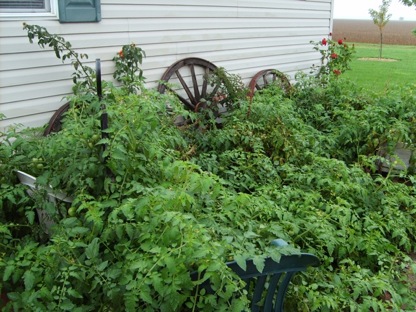
In the film To Kill a Mockingbird, there’s a scene where young Jem goes back to the Radley’s collard patch late at night to retrieve the britches he’d abandoned earlier after snagging them in a fence. Some days later, when his sister Scout catches him admiring the trinkets he found in a tree near the Radley home, Jem confesses to her the truth about the night he went back after his pants.
When I’d left ’em, they were all in a tangle and I couldn’t get ’em loose, he says. But when I went back for ’em, they were folded across the fence… sort of like they was expectin’ me.
For the past two months, every time I pulled into my mother’s driveway and saw Earl’s tomato plants spread out further and thicker than they were the day before, I could hear echoes of those words … sort of like they was expectin’ him …
Like a loyal dog sitting faithfully by the door — an ear tilted sideways, awaiting familiar footsteps and sounds of the master’s return — the tomato vines kept listening, leaning, yawning, spreading out their arms to sleep and curling themselves around the empty lawn chair’s legs where he once sat and then waking to another day to nudge against the bright yellow Tonka truck toy he’d parked in their bed … almost as if they still were expecting him to come back home and play and pluck an annoying weed from their loom like an unsightly burr from a retriever’s golden coat.
He had waited for them first, using his index finger and one good eye to sight the one he’d chosen as his favorite.
“Right there. It’s already turning red. See it?” he’d said, hunching over and pointing into the sparse vines. And I’d followed his gaze to where the small but plump orb blushed amidst its less developed sister fruit. “That’s the one I’m waiting for,” he’d said proudly. “That one’s mine.”
On his knees, he’d planted these seeds and gently blanketed them with soil and cared for and tended to them with the same kind of commitment he bestowed upon all things he molded and created with his own two hands. But some time in the night’s dark hours, the Boo Radley of Jem and Scout’s deepest fears came to rob this man of his life and loves and the pleasures he derived from taking simple moments like these and turning them into something spectacular.
Still, his tomato plants waited.
They waited while … six days after his funeral … my mother passed by them on her way to the hospital for the breast lumpectomy and returned with her breast cancer diagnosis.
They waited and spread out toward the east while … one week later … Mom’s doctor told her she needed to make a decision.

They waited and spread toward the west and wrapped around the heart-shaped sign reading “Grandpa and Grandma – Kids Spoiled Here While You Wait,” while … two and one-half weeks later … another car took her away for the mastectomy and returned with all these other vehicles and so many lively children.
They waited while … amidst all the muffled voices and words like metastasized and chemo and numerous close calls with small running feet and shrill laughter and surprising phrases like bad-year-for-tomatoes-everywhere and questions like he-did-what-with-his … new buds spurted forth and heavier vines swept down and around them like mother hens pulling rowdy chicks back and away from the busy traffic in Earl’s driveway.
They waited and snaked around the legs of his white chair and climbed up higher for breathing room and a view of dozens more green offspring below while … careening near the chair’s arm where he used to lay his elbow … they sucked in the late October sun as new words like collapsed lung and it’ll be freezing soon drifted over the rail near the door and filtered down between the effervescent green foliage.
And so, as the month drew to a close and I returned my mother to her home after the morning’s hospital visit where they made her blood radioactive to prepare for chemo treatments and she said we need to get the tomatoes out by nightfall lest they freeze, I looked down at the tangling vines and thought about how their roots of hope had somehow spawned hundreds of tomatoes, and, against all odds, continued to multiply and produce as if their very life — or, perhaps, ours — depended upon it.
“But some of them are still so … small,” I said. “They haven’t even had a chance to ripen.”
Yet, I knew.
Like Jem and Scout and Dill mourning summer’s end, Earl’s tomato plants hadn’t yet realized their season had come and gone. Their life cycle, like Earl’s, left so much still ripening on the vine.
Still, I could not bring myself to pick them. Perhaps I wasn’t yet ready to say goodbye to summer. Perhaps I wasn’t yet ready to say goodbye to the interlocking green stems that still drew energy from the sun and soil. Perhaps I wasn’t yet ready to say goodbye to Dad Earl. Cutting down his tomato plants — even in the face of a freeze that surely threatened to kill them all — was too much like severing all hope he’d return once again to gather his offspring in his arms … if only for one final moment.
In Flannery O’Connor’s A Good Man is Hard to Find, she, like Harper Lee, recognized that which separates good and evil and redemption from sin.
In Earl, we found a good man. In Earl, we found our own Atticus Finch.
And his spirit, I know, will be there with us when we go to sleep at night and it will be there when we wake up in the morning.